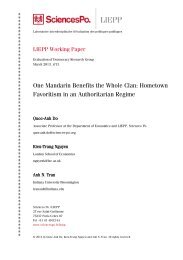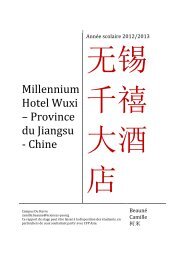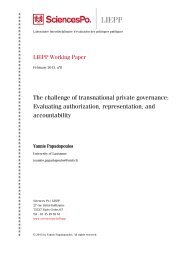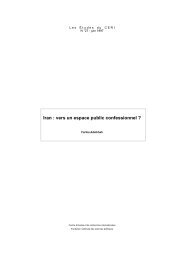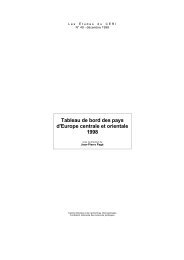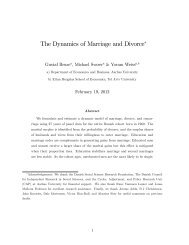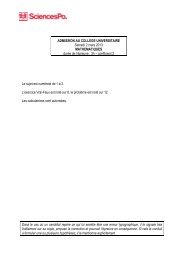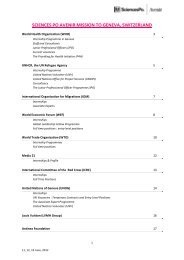Brochure Collège Universitaire - Sciences Po
Brochure Collège Universitaire - Sciences Po
Brochure Collège Universitaire - Sciences Po
- No tags were found...
You also want an ePaper? Increase the reach of your titles
YUMPU automatically turns print PDFs into web optimized ePapers that Google loves.
éditoINTRODUCTIONHybridation des collèges d’artslibéraux anglo-saxons et des classespréparatoires françaises, le Collègeuniversitaire de <strong>Sciences</strong> <strong>Po</strong> délivre uneformation intellectuelle fondamentaleancrée dans l’étude des humanités et dessciences sociales. C’est le terreau danslequel s’enracinent les formationsspécialisées des Masters. Animé par unegrande exigence intellectuelle, le Collègeaccorde une place tout aussi importanteau développement personnel des élèvesen proposant des activités extrauniversitaires,culturelles et sportives.La vie de la promotion prend un sensencore plus particulier en région où lesélèves bénéficient de conditions d’étudeset de travail exceptionnelles. Avec un tauxd’encadrement important, ces petitescommunautés d’étudiants de toutesnationalités sont porteuses d’unformidable dynamisme.<strong>Sciences</strong> <strong>Po</strong> College is a crossbetween French “classespréparatoires” and a liberal arts college,providing intellectual training anchoredin the study of the humanities and thesocial sciences. The College is themultidisciplinary foundation upon which<strong>Sciences</strong> <strong>Po</strong>’s highly specialized Master’sprograms rest. With academic rigor as itshallmark, the <strong>Sciences</strong> <strong>Po</strong> College givesequal importance to fostering thepersonal development of its studentsthrough a rich variety of cultural andathletic offerings. Student life is furtherenriched at the College’s regionalcampuses, where students benefit froman exceptional study environment.Featuring a high degree of personalizedstudent support, these small, highlyinternational educational communitiesbrim with energy and ideas.Richard Descoings,DIRECTEUR DE SCIENCES PODIRECTOR OF SCIENCES POCollège universitaire I 3
3Une grande univer« Me décider pourma 3 e année a étéun choix difficile :j’ai finalement optépour un stage enInde dans uneassociationhumanitaire, oùj’ai continuéd’apprendre lehindi que j’avaiscommencé à<strong>Sciences</strong> <strong>Po</strong>.L’autre possibilitéétait un échangeavec l’Universitéde New Delhi. »Marina, ÉTUDIANTE EN 3 ÈME ANNÉESCIENCES PO & L’INTERNATIONAL1 0001841 %7015étudiants en 3 e annéeà l’étranger3 rd year students studyingabroaddoubles diplômeset cursus intégrésdual degreesand combined curriculad’étudiants internationauxforeign studentsnationalitésnationalitieslangues enseignéeslanguages taught<strong>Sciences</strong> <strong>Po</strong> se place résolumentdans le champ de la compétitioninternationaleCela se traduit concrètement dans laformation par :la 3 e année obligatoire à l’étranger,en séjour d’étude ou en stage(entreprises ou administration) ;des cours en langue étrangère ;des enseignements ouverts à desapproches comparatistes ;l’accueil tous les ans d’une centainede professeurs invités ;des doubles diplômes avec lesétablissements les plus prestigieux :Columbia University, London School ofEconomics, Georgetown University,…<strong>Sciences</strong> <strong>Po</strong> is highly competitiveinternationallyeach student spends their third yearabroad either studying or completingan internship in a company or anadministrative body;the curriculum is multi-lingual;we are open to comparative teachingapproaches;we welcome more than one hundredvisiting professors each year;the school also offers dual degreeprograms with a number of prestigiousforeign universities, including theLondon School of Economics, andColumbia and GeorgetownUniversities.8 I Collège universitaire
AN INTERNATIONALLY RECOGNIZED UNIVERSITYsité internationale“Les campusen régionaccueillent chaqueannée des promotionsd’élèves de toutesnationalités, ouvertssur le monde, quiconstituent le plusbel exemple et le pluspuissant levier qu’onpuisse espérer pourfavoriser l’intégrationinternationale de<strong>Sciences</strong> <strong>Po</strong>.Des campus ouverts sur le mondeVéritables creusets internationaux,les campus de Dijon (Europe centraleet orientale), Le Havre (Europe-Asie),Menton (Moyen-Orient, Méditerranéeet Golfe), Nancy (Allemagne, espacegermanophone), <strong>Po</strong>itiers (Amériquelatine, Espagne, <strong>Po</strong>rtugal), Reims(Relations transatlantiques) affirmentune identité propre par rapport aucampus parisien, qui repose sur :une spécialisation par airegéographique ;le recrutement à parité d’étudiantsfrançais et internationaux ;une communauté d’élèves à taillehumaine (100 à 250 étudiants parcampus) ;au moins trois langues de travailet d’enseignement.Genuinely international campusesThe regional centres in Dijon (Centraland Eastern Europe), Le Havre(Europe-Asia), Menton (The Middle Eastand the Mediterranean), Nancy(Germany and other German-speakingcountries), <strong>Po</strong>itiers (Latin America,the Iberian peninsula), and Reims(transatlantic relations) differ in severalrespects from <strong>Sciences</strong> <strong>Po</strong> in Paris.each centre is specialized in aparticular region of the world.there are as many foreign studentsas French students,students numbers are low - 100 to250 students at each regional centre -which means that each campushas a real community feel,furthermore, all our provincialcampuses have at least three workinglanguages.Richard Descoings,DIRECTEUR DE SCIENCES PO”300 UNIVERSITÉS PARTENAIRESPrinceton University, Harvard University,Columbia University, University ofPennsylvania, Georgetown University,University of Chicago, London School ofEconomics, The Australian NationalUniversity, Waseda University, NationalUniversity of Singapore, QinghuaUniversity, Chinese University of HongKong, Fudan University, MGIMOUniversity, Warsaw School of Economics,Stockholm School of Economics,University of Sankt Gallen, FreieUniversität Berlin, Humboldt Universitätzu Berlin, Bocconi University, Mc GillUniversity, University of Toronto, OxfordUniversity, King’s College London,S t Andrews University, UniversidadeTorcuato di Tella, Colegio de Mexico,Universidade de Sao Paulo, Universitat<strong>Po</strong>mpeu Fabra, Al Akhawayn UniversityIn Ifrane, University of Galatasaray…Undergraduate Program I 9
4Devenir l’un des« 80% d’entrenous choisissentle secteur privéaprès le diplôme.Avec 15 mastersprofessionnelset de nombreusesspécialisations,on a le choix dumétier que l’onveut exercer. »Laurent,ÉTUDIANT EN 5 ÈME ANNÉE,MASTER FINANCE ET STRATÉGIEQUE DEVIENNENT NOS DIPLÔMÉS ?1,3 % SECTEUR PUBLIC DES PAYS ÉTRANGERS2,7% COMMERCE, DISTRIBUTION2,9 % DIPLOMATIE4,2 % CABINETS D'AVOCATS4,8 % ORGANISATIONS INTERNATIONALES5 % ÉDUCATION, RECHERCHE, THINK TANKS5 % ACTIVITÉS CULTURELLES, CINÉMA5,8 % URBANISME, ARCHITECTURE, HABITAT5,8 % ONG, ASSOCIATIONS6,9 % COMMUNICATION, PUBLICITÉ7,4 % INDUSTRIE, ÉNERGIE, TRANSPORTS7,7 % ADMINISTRATIONS PUBLIQUES8,5 % PRESSE, MÉDIAS, ÉDITION9,3 % BANQUE, FINANCE, ASSURANCE10,1 % AUTRES12,5% AUDIT ET CONSEILSource enquête TNS-Sofres jeunes diplômés <strong>Sciences</strong> <strong>Po</strong> 200910 I Collège universitaireLe Collège universitaire se déploie surtrois ans, au cours desquels les élèvessont amenés à se confronter auxexigences du monde professionnel àtravers les enseignements (initiation àla vie de l’entreprise, études de cas,…),un stage de terrain obligatoire, lapossibilité d’un stage long de 10 moisen troisième année et la présence depraticiens parmi les enseignants (cadresd’entreprise, hauts fonctionnairesfrançais ou internationaux).Au sortir du Collège les étudiants ont lechoix entre 15 Masters, adaptés enpermanence aux besoins des recruteurs,qui combinent formation fondamentale,enseignements de spécialisation etstages professionnels.À l’issue du Master, les élèves peuventrejoindre l’un des cinq programmesdoctoraux : Économie, Histoire, Droit,Science politique, Sociologie.During their three-year undergraduatestudies, students are prepared for theirfuture careers in a number of ways.In the classroom, the case studyapproach is extensively used; studentscomplete an internship and have theoption of doing another 10-monthinternship during their third year.Furthermore, many of our teaching staffare experienced professionals (seniormanagers, high-ranking French andforeign civil servants).Once they graduate from <strong>Sciences</strong> <strong>Po</strong>College, students can choose between15 Master’s programs tailored to meetrecruiters’ needs by combining corecourse, electives and internships.After finishing their Master’s, studentscan enroll in one of five doctoralprograms: Economics, History, Law,<strong>Po</strong>litical Science, and Sociology.
BECOME A FUTURE DECISION-MAKERdécideurs de demainILS ONT FAIT SCIENCES POBoutros Boutros Ghali (Diplomate,ancien Secrétaire général de l’ONU),Philippe Camus (Co-Présidentde Alcatel-Lucent),Claire Chazal (Journaliste)Jacques Chirac (Ancien Présidentde la République française),Pierre de Coubertin (Fondateurdes Jeux Olympiques modernes),Christian Dior (Grand couturier),Laurent Fabius (Ancien PremierMinistre),Léo Ferré (Chanteur),Stanley Hoffmann (<strong>Universitaire</strong>),Jean-Pierre Jouyet (Secrétaire d’Étatchargé des Affaires européennes),Chandrika Kumaratunga (AnciennePrésidente du Sri Lanka),Pascal Lamy (Directeur Généralde l’OMC),Laurence Parisot (Présidente duMEDEF),Marcel Proust (Écrivain),Anne Sinclair (Journaliste),Jean-Cyril Spinetta (PDG Air France),Pierre Eliott Trudeau (Ancien PremierMinistre canadien)…Après le Collège universitaire, les élèvesont le choix entre les Masters suivants :Affaires publiques ;Affaires européennes ;Affaires internationales ;Carrières judiciaires et juridiques ;Corporate and Public Management ;Droit économique ;École de la Communication ;École de Journalisme ;Economics and Public <strong>Po</strong>licy ;Finance et stratégie ;Gestion des ressources humaines ;Global and Comparative Legal Studies ;Marketing et études ;Stratégies territoriales et urbaines ;<strong>Sciences</strong> et politiques del’environnement.Upon completion of their undergraduatestudies, students select from one of thefollowing Master’s programs:Public Affairs;European Affairs;International Affairs;Professional Legal Studies;Corporate and Public Management;Economic Law;Communications;Journalism;Economics and Public <strong>Po</strong>licy;Finance and Strategy;Human Resources Management;Global and Comparative Legal Studies;Marketing;Territorial and Urban Strategy;Environmental Studies.Bachelor MasterDOCTORATMASTER DE SCIENCES PO BAC + 5MASTER 2 >MASTER 1 >PRÉPACONCOURS2 e ANNÉE À PARISBACHELOR DE SCIENCES PO BAC + 3BACHELOR 3 >BACHELOR 2 >BACHELOR 1 >1 e ANNÉE2 e ANNÉE1 e ANNÉEDIPLÔMED'ENSEIGNEMENT SECONDAIREUndergraduate Program I 11FORMATION CONTINUEÀ PARIS3 e ANNÉE À L’ÉTRANGERANGERS, DIJON, LE DIJON, HAVRE, LE HAVRE,MENTON, NANCY, PARIS,POITIERS, REIMSDIJON, LE HAVRE,MENTON, NANCY, PARIS,POITIERS, REIMS
PARTICIPATE IN PUBLIC LIFEla vie publiqueILS SE SONT EXPRIMÉSÀ SCIENCES POLa vie associativeL'engagement associatif et citoyen estinscrit au coeur même du projet éducatifde <strong>Sciences</strong> <strong>Po</strong> : il contribue àdévelopper la culture du débat et formede futurs décideurs à la gestion deprojet.S'il permet avant tout aux élèves dese retrouver autour d'aspirationscommunes, de communiquer et partagerleurs centres d'intérêt avec unecommunauté étudiante et académiqued'une grande richesse, il est aussi unmoyen de vivre pleinement sacitoyenneté. Chaque année, plus de80 associations rythment la vie de<strong>Sciences</strong> <strong>Po</strong> et proposent près de170 manifestations !Clubs and associationsInvolvement in clubs and associationsis central to the <strong>Sciences</strong> <strong>Po</strong>experience: future leaders are giventhe opportunity to hone their debatingskills and gain experience in projectmanagement.The primary role of clubs is to bringtogether individuals who wish to sharetheir common interests with othermembers of the teaching and studentcommunities.They are a vital part of student life:each year more than 80 associationsare active at <strong>Sciences</strong> <strong>Po</strong> and organizemore than 170 events!De gauche à droite etde haut en basMuhammad Yunus(Prix Nobel de la paix),Steve Ballmer(PDG de Microsoft),Condolezza Rice(Secrétaire d’État des États-Unis),Amartya Sen(Prix Nobel d’économie),Mikhail Gorbatchev(Ancien dirigeant de l’URSS),Carlos Gohsn(PDG de Renault),Ioulia Timochenko(Premier Ministre de l’Ukraine),Shimon Peres(Président de l’État d’Israëlet Prix Nobel de la paix),Prince Karim Aga Khan(Leader de la communautéismaélienne),Nicolas Sarkozy(Président de la Républiquefrançaise),Ségolène Royal(Présidente du Conseil régionalde <strong>Po</strong>itou-Charente),Pascal Lamy(Directeur général de l’OMC).LA VIE ÉTUDIANTE EN CHIFFRES1695colloques et conférencesorganisés dans l’annéepar les élèvescolloquiums andconferences organizedduring the year by studentssyndicats représentés dansles instances de l’institutionactive student unionsUndergraduate Program I 13
CAMPUS DE DIJONLes défis deCapitale régionale de la Bourgogne, Dijon est une villedynamique au patrimoine culturel important. Sa vieilleville avec ses églises et ses maisons à pans de bois estun fleuron de l’époque médiévale.À proximité de la place Darcy, au seind’un beau bâtiment du XIX e siècle,le programme de Dijon accueille desétudiants souhaitant s’investir dansle projet européen, qu’ils viennent deFrance, d’Europe centrale et orientaleou des quatre coins de la planète…Dédié aux défis de l’Union européenned’aujourd’hui, le programme abordeavec un accent particulier lesspécificités des États d'Europe centraleet orientale.Il s’inscrit dans la tradition de rechercheet d’expertise de <strong>Sciences</strong> <strong>Po</strong> sur latransition démocratique en Europecentrale menée par le Centre d’Étudeset de Recherches Internationales etdans la tradition d’échanges forts avecnotamment la République tchèqueet la <strong>Po</strong>logne.<strong>Sciences</strong> <strong>Po</strong>’s Dijon UndergraduateProgram is housed in a handsome 19 thcentury building near the Place Darcy.Students - from France, Central andEastern Europe and even farther afield -come to Dijon to study the EuropeanUnion, with a particular focus on thecountries of Central and EasternEurope.This program evidences <strong>Sciences</strong> <strong>Po</strong>’scontinuing interest in studyingdemocratic transition in CentralEurope, which was initiated byresearchers at the Centre ofInternational Research.It has also strengthened the school’slongstanding ties with the CzechRepublic and <strong>Po</strong>land.Studying in France is great, but to discoverEurope in all its richness and diversity iseven better. After all, the Dijon campus is like acondensed version of Europe.Ana, 2 nd year student, Dijon14 I Cycle européen Europe centrale et orientale
l’Europe élargieDijon, capital of the Bourgogne region,is a dynamic city with a rich cultural history,boasting a historic centre featuring medievalchurches and half-timbered houses.Le campus de Dijon secaractérise par :Un cursus spécialisé surl’Union européenne et l'Europecentrale et orientaleL’apprentissage d’une languecentre-européenne (polonais,tchèque, hongrois)Le perfectionnement du russeUn cursus français renforcépour les étudiants faiblementfrancophones117 élèves de 23 nationalitésThe Dijon UndergraduateProgram features on:a curriculum on the EU andCentral and Eastern Europethe opportunity to masterRussianthe opportunity to study aCentral European language(<strong>Po</strong>lish, Czech or Hungarian)French language courses117 students from 23countrieshttp://college.sciences-po.fr/sitedijon/
Europe-AsieLocated on the Normandy coast, Le Havre washome to many leading Impressionists in the 19 thcentury and its city centre, designed by AugustePerret, has been designated a UNESCO WorldHeritage Site.Le campus du Havrese caractérise par :Un cursus spécialisé surles grandes problématiqueseuropéennes et asiatiquesUn programme assuré pardes nombreux spécialistesde la régionUn enseignement intensifdes langues orientales eteuropéennes100 élèves de 20 nationalitésThe Le Havre UndergraduateProgram features on:a curriculum on Europe and Asiataught by leading AsiaspecialistsAsian and European languageinstructionStudent body of 100 from20 different countrieshttp://college.sciences-po.fr/sitehavre/
CAMPUS DE MENTONMoyen-Orient,Au cœur de la côte d’Azur, à proximité de l’Italieet de Monaco, le campus Moyen-Orient, Méditerranée,Golfe est installé à Menton, célèbre pour sonmicroclimat, sa vieille ville, son panoramaet ses jardins.Au cœur de la vieille ville, le campusaccueille une promotion d’étudiantsvenant d’Europe, d’Afrique du Nord,du Moyen-Orient et du Golfe, mais aussidu monde entier. Ils étudient les grandsenjeux politiques, économiques etsociaux qui traversent la zone Moyen-Orient, Méditerranée, Golfe ainsi queles dynamiques nouvelles qui relientcette région d’Europe à l’Asie et àl’Amérique.À Menton, les étudiants apprennent àvivre et à travailler ensemble dans unenvironnement international et multiculturelfavorisant le dialogue, le débatet la connaissance réciproque.The Menton campus is located in the city’sattractive historic centre and welcomesstudents from around the world. Europe,North Africa, the Middle East and the GulfStates are particularly well represented.Our undergraduate courses focus onthe key political, economic, and socialchallenges facing this region, as well asits evolving interactions and exchangeswith Europe, Asia and the Americas.Our international student body and multidisciplinaryapproach make the Mentoncampus a forum for knowledge sharing,debate and cultural exchange.I am from Saudi Arabia and wanted to pursueInternational Studies at a top global institutionlocated in Europe. Here, I can do it in anenvironment that enables me to think about theMiddle East and work in three languages, includingmy own.Mona, 2 nd year student, Menton18 I Cycle Moyen-Orient, Méditerranée, Golfe
Méditerranée et GolfeThe Middle East, Mediterranean and Gulf Statesprogram is taught on our Menton campus.The town of Menton lies on the French Riviera,close to Monaco and the French-Italian border,and is famous for its beautiful vistas, gardens,and year-round mild climate.Le campus de Mentonse caractérise par :Un cursus spécialisé sur lesquestions du Moyen-Orient, dela Méditerranée et du GolfeDes cours dispensés en troislangues : le français, l’anglaiset l’arabeL’apprentissage intensifde l’arabe pour les élèvesnon-arabophonesUn cursus entièrement enanglais également disponible130 élèves de 30 nationalitésThe Menton UndergraduateProgram features on:a curriculum on the MiddleEast, the Mediterranean and theGulf StatesClasses taught in French, Englishand ArabicIntensive Arabic classesavailable for non-Arabic speakersthe opportunity to follow aprogram taught exclusivelyin English130 students from 30countrieshttp://college.sciences-po.fr/sitementon/
CAMPUS DE NANCYAllemagne,Nancy, grande ville universitaire à 1h30 de Paris, étaitla capitale des Ducs de Lorraine. La ville est connuepour son patrimoine «Art Nouveau» et ses joyauxdu XVIII e siècle, dont la place Stanislas, classésau patrimoine mondial de l’Humanité.Nancy joue un rôle essentiel commeville universitaire avec près de 50 000étudiants.Au cœur du triangle Sarre-Lor-Lux,la métropole nourrit une politiquerégionale franco-allemande ambitieuse,notamment à travers la qualité de sesrelations avec l’université de la Sarre.Dans le cadre prestigieux de l’Hôteldes missions royales, construit en 1741,les élèves, pour moitié germanophoneset pour moitié francophones, étudient ledynamisme de l’espace germanophone.Première puissance économiqueeuropéenne, acteur incontournable dansles relations avec l’Europe élargie,l'Allemagne a toujours été un domainede coopération scientifique pour<strong>Sciences</strong> <strong>Po</strong>.Nancy spielt mit fast 50 000 Studenteneine wichtige Rolle als Universitätsstadt.Die Metropole im Herzen des DreiecksSaarland-Lothringen-Luxemburg pflegteine ehrgeizige deutsch-französischeRegionalpolitik, auch durch ihre gutenBeziehungen zur Universität desSaarlandes.Im stilvollen Rahmen des „Hôtel desmissions royales“ aus dem Jahre 1741studieren die Schüler, von denen dieeine Hälfte Franzosen und die andereHälfte Deutsche sind, die Dynamik desdeutschsprachigen Raums.Als erste europäische Wirtschaftsmachtund unumgehbarer Partner in denBeziehungen zum erweiterten Europa,war Deutschland schon immer ein Feldder wissenschaftlichen Zusammenarbeitfür <strong>Sciences</strong> <strong>Po</strong>.Im ersten Studienjahr sind wir nach Berlin gefahren,um dort das politische System Deutschlands zustudieren. Dieses Jahr fahren wir für eine Woche nachWien, es geht um das Thema Internationale Beziehungen.Jedes Mal treffen wir dabei Spitzenpolitiker, wie inBerlin den ehemaligen Bundespräsidenten Richard vonWeizsäcker.Eva, Studentin im zweiten Studienjahr, Nancy20 I Cycle européen Allemagne, espace germanophone
espace germanophoneNancy, eine große Universitätsstadt 1,5 Stundenvon Paris, war ehemals die Hauptstadt derHerzöge von Lothringen. Die Stadt ist für dieSchönheit ihrer Bauwerke aus der Zeit desJugendstils und des 18. Jahrhunderts bekannt,unter anderem auch den Platz Stanislas, der zumWeltkulturerbe gehört.Le campus de Nancyse caractérise par :Un cursus trilingueen français, anglais et allemandUn double diplôme avec la FreieUniversität de BerlinUne équipe pédagogiquecomposée de nombreux.spécialistes de l’AllemagneLe forum EurocosmosLa Chaire Alfred Grosser300 étudiants de 28 nationalitésDer Campus Nancyzeichnet sich aus durch:Einen dreisprachigenStudiengang in Englisch,Französisch und DeutschEinen doppelten Abschluss mitder Freien Universität Berlinein Professorenkollegium, das sichaus zahlreichen Deutschland-Spezialisten zusammensetztDas EurocosmosforumDen Alfred Grosser Lehrstuhl300 Studenten aus 28 Ländernhttp://college.sciences-po.fr/sitenancy/
CAMPUS DE PARISAu carrefourLe campus de Paris est situé à Saint-Germain-des-Prés,à cinq minutes du Louvre et du Quartier Latin,au centre d’une des villes les plus fascinantesau monde.Le campus de Paris est le cœurhistorique de <strong>Sciences</strong> <strong>Po</strong>. Toute larichesse de la ville s’y retrouve, avec uncorps enseignant composé non seulementde grands universitaires et d’intellectuels,mais également de professionnels, cadresdirigeants ou hauts fonctionnaires.Ce campus urbain, ouvert sur le monde,accueille chaque année un millierd’étudiants venant des 300 universitéspartenaires pour accomplir un semestreou une année d’étude à <strong>Sciences</strong> <strong>Po</strong>.Leur présence et le développementd’enseignements en anglais sont unesource constante d’innovationpédagogique et intellectuelle.Les 80 associations d’étudiants,artistiques, syndicales, politiques,culturelles ou humanitaires, participentà l’intensité de la vie sur le campus etstimulent la personnalité etl’imagination des étudiants.The Paris Undergraduate Program datesback to the school’s foundation. It drawson the city’s incomparable culturalresources, boasting a teaching bodycomposed of distinguished professorsand intellectuals, as well as topprofessionals, managers and civilservants.The city campus is a global hub,welcoming annually more than 1000students from its 300 partneruniversities either for a semester orthe full year. The presence of a sizeableforeign student body and the everincreasingnumber of classes taught inEnglish contribute to the pedagogicaland intellectual development of theschool. Campus life is enriched by our80 student associations, which includepolitical, cultural, humanitarian andstudent activities groups.Avec la présence de nombreux étudiants enéchange, on entend parler toutes les languesdans le jardin. Sans même voyager, j’ai la possibilitéde me faire des amis de cultures très différentes.François, étudiant en 3 ème année, Paris22 I Collège universitaire de Paris
des culturesThe Paris campus is in Saint-Germain-des-Prés,close to the Louvre and the Quartier Latin, in thecentre of one of the great cities of the world.Le campus de Parisse caractérise par :deux programmes spécifiques avecdes universités américaines : GeorgeWashington et Northwesterncinq doubles cursus :<strong>Sciences</strong> et sciences sociales (avecParis VI) ; <strong>Sciences</strong> de la vie etsciences sociales (avec Paris VI) ;Lettres et sciences sociales (avecParis IV) ; Philosophie et sciencessociales (avec Paris IV) ;Mathématiques appliquées etsciences sociales (avec Paris I)The Paris UndergraduateProgram features on:two special curricula in partnershipwith the George Washingtonuniversity and NorthwesternUniversityfive dual degrees: science andsocial sciences (with Paris VI); lifesciences and social sciences (withParis VI); literature and socialsciences (with Paris IV); philosophyand social sciences (with Paris IV);and applied mathematics and socialsciences (with Paris I)http://college.sciences-po.fr/siteparis/
CAMPUS DE POITIERSAmérique latine,Capitale de la région <strong>Po</strong>itou-Charentes, à 1h30de Paris en TGV, <strong>Po</strong>itiers compte près de 25 000étudiants. La ville, haut lieu de l’art roman, étonneavec ses rues médiévales et ses quatre-vingtsmonuments classés et protégés.Lieu de passage vers la péninsuleibérique, la région <strong>Po</strong>itou-Charentes,avec sa façade atlantique, est égalementtraditionnellement tournée vers lemonde latino-américain. Le campusde <strong>Po</strong>itiers bénéficie des nombreuxpartenariats noués par l’université.Camino a la península ibérica,a región <strong>Po</strong>itou-Charentes, con sucosta atlántica goza de una tradiciónde apertura hacia el mundolatinoamericano. En <strong>Po</strong>itiers,el Campus mantiene una estrecharelación con la universidad.Dans l’Hôtel Chaboureau, datant du XV esiècle, au cœur du centre ville et en facede l’Eglise Notre-Dame, les élèveshispanophones, lusophones etfrancophones se consacrent à l’étude del’Amérique latine : véritable laboratoired’adaptation à la mondialisation.En el Hôtel Chaboureau – mansióndel siglo XV-, situado en el centrohistórico de la ciudad y frente a laIglesia Notre-Dame, los estudianteshispano, luso y francoparlantes sededican al estudio de América latina:verdadero laboratorio de adaptacióna la globalización.Con mis compañeros franceses hablo francés y conlos otros hablo en español…o, si no, hablo en ‘frañol’Miguel, estudiante de primer año, <strong>Po</strong>itiers24 I Cycle Amérique Latine, Espagne, <strong>Po</strong>rtugal
Espagne, <strong>Po</strong>rtugalCapital de la Región <strong>Po</strong>itou-Charentes, a 1h30de Paris en tren de alta velocidad -TGV, <strong>Po</strong>itierses una ciudad de cerca de 25 000 estudiantes.Símbolo de arte romano, <strong>Po</strong>itiers impresionacon sus callejuelas medievales y sus ochentamonumentos clasificados históricos y protegidos.Le campus de <strong>Po</strong>itiersse caractérise par :Quatre langues obligatoires :le français, l’espagnol, le portugaiset l’anglaisDes cursus intégrés avec lesUniversités Catholique de SãoPaulo (Brésil), Torcuato di Tella(Argentine), Catholique du Chili164 élèves de 26 nationalitésUn forum annuel sur ladémocratie participativeLes invitamos a conoceralgunas de las característicasdel Campus de <strong>Po</strong>itiers :Cuatro idiomas deenseñanza: francés, español,portugués e inglésDoble titulaciones con lasUniversidades Católica de SaoPaulo, Católica de Chile yTorcuato di Tella (Buenos Aires)164 estudiantes representandomás de 26 nacionalidadesUn foro anual dedicado a lademocracia participativahttp://college.sciences-po.fr/sitepoitiers/
OUVERTURERENTRÉE 2010-2011CAMPUS DE REIMSRelationsÀ 45 minutes de Paris en TGV, Reims, la Cité du sacredes rois de France, dispose d’un patrimoine architectural,qui témoigne de la prospérité de la ville et de saposition stratégique depuis l’époque gallo-romaine.Ville du Champagne, Reims évoque aussi l’universraffiné d’un vin prestigieux.Premier pôle économique de la régionChampagne-Ardenne, Reims est lahuitième ville universitaire et sportivede France avec 26 000 étudiants.Au sein de l’ancien collège des Jésuites,ensemble architectural du XVII ème siècle,les élèves à majorité européens etnord-américains se consacreront àl’étude des échanges transatlantiquesentre l’Europe et l’Amérique du Nord.Le campus de Reims bénéficierade l’ancienneté et de la densité desrelations que <strong>Sciences</strong> <strong>Po</strong> entretientavec l’Amérique du Nord, avec plusde 80 partenaires académiques auxEtats-Unis et au Canada, parmi lesquelsHarvard, Princeton, Columbia, Berkeley,UBC, Mc Gill, Toronto, et la plusimportante population d’étudiantsnord-américains reçus chaque annéeen France.Reims is economically the mostimportant city in the Champagne-Ardenne region, and is the eighthbiggest university town in France,with a student population of 26 000.The university located in a XVII thcentury former Jesuit college.Most students hail from Europe andNorth America and specialize intransatlantic relations.<strong>Sciences</strong> <strong>Po</strong> has more North-Americanstudents than any other French highereducational institution and has closeand long-standing relations withmore than 80 American andCanadian universities, includingHarvard, Princeton, Columbia, Berkeley,UBC, Mc Gill, and the university ofToronto.Transatlantic relations are crucial to theunderstanding of globalization. North Americaand Europe share unique responsabilities for thebuilding of a new, more harmonious world.Francis Vérillaud, Vice Président,Director of the International Affairs Division26 I Cycle transatlantique
transatlantiquesReims, where the kings of France used to becrowned, is a city whose rich architectural heritagereflects a long and prosperous history, dating backto the Gallo-Roman period. It is also well known asthe home of champagne, and can be reached fromParis by TGV in less than an hour.Le campus de Reimsse caractérise par :Une équipe pédagogiquecomposée de nombreuxspécialistes des relationstransatlantiquesUn cursus anglophone200 élèvesThe Reims UndergraduateProgram features on:a team of specialistsin transatlantic relationsa core curriculum taughtentirely in englisha student body of 200http://college.sciences-po.fr/sitereims/
FAQADMISSIONSQuelle procédure d'admission dois-je suivre pour me présenter en Collège universitaire ?Vous devez vous présenter par la procédure d'admission par examen (cursus français) si :. Vous avez obtenu un baccalauréat français en France et souhaitez intégrer le Collège universitairede <strong>Sciences</strong> <strong>Po</strong> à Paris ou en région.. Vous avez obtenu un baccalauréat français à l’étranger (ou autre diplôme étranger) et souhaitezintégrer le campus de Paris.Cette procédure est composée de 4 épreuves écrites et se déroule une fois par an à Paris. Si vous avezobtenu une mention Très Bien au baccalauréat vous pouvez demander une dispense d'examen.Cette dispense est accordée ou refusée après instruction du dossier de candidature.Vous pouvez vous présenter par la procédure internationale si :Vous avez obtenu un baccalauréat français à l’étranger ou un Diplôme d’études secondaires étranger(en France ou à l’étranger) et souhaitez suivre vos études dans un campus en région (vous ne pouvez paspostuler par cette procédure pour le campus de Paris).Cette procédure comporte une sélection sur dossier, suivie en cas d'admissibilité d'un entretien oral.Les entretiens sont plurilingues, organisés dans plus de 70 villes à travers le monde, et destinés à évaluerprincipalement la motivation, le profil, le parcours et le projet personnel du candidat.Vous pouvez vous présenter par la procédure "Conventions d'éducation prioritaire" si :Vous souhaitez intégrer le 1 er Cycle à Paris ou en région et vous êtes élève dans un Lycée en Zoned’Education Prioritaire qui a signé une convention avec <strong>Sciences</strong> <strong>Po</strong>.Cette procédure comporte deux étapes : l'admissibilité, décidée par les équipes enseignantes de chaquelycée partenaire (présentation orale d'une revue de presse, d'une note de synthèse et d'une réflexionpersonnelle) et l'admission (entretien oral à <strong>Sciences</strong> <strong>Po</strong>).http://admissions.sciences-po.fr/LE LOGEMENT ÉTUDIANTQuelle aide puis-je obtenir pour trouver un logement étudiant ?Le service logement de <strong>Sciences</strong> <strong>Po</strong> accompagne les élèves dans leurs démarches de recherchede logement par différents moyens : propositions d'offres variées et conseils sur les bons usagesen matière de location.Un partenariat avec le Bureau des Elèves (BDE) permet la mise en ligne des différentes offres de proximité :http://www.bdescpo.infoÀ Paris, comme dans les campus en région, les élèves peuvent contacter la personne directement en chargede cette question du logement étudiant.http://www.sciences-po.fr/formation/inscriptions/logement/AIDE SOCIALEQuel est le montant de l’aide sociale ?<strong>Sciences</strong> <strong>Po</strong> consacre chaque année plus de 4,3 millions d’euros à l’aide sociale. Tous les étudiantsboursiers, selon les critères du Crous, sont exonérés des droits de scolarité et perçoivent une boursede <strong>Sciences</strong> <strong>Po</strong>.Je ne suis pas Français, puis-je tout de même espérer obtenir une bourse ?Oui, l’engagement de <strong>Sciences</strong> <strong>Po</strong> pour les élèves ressortissants d’un État de l’Union européenne est trèsfort, puisque leur sont appliqués les mêmes critères d’attribution de bourses qu’aux élèves français.Ces bourses peuvent couvrir les frais de scolarité et même comporter un complément permettant de financerla vie en France.http://www.sciences-po.fr/formation/inscriptions/aide_sociale/index.htmDROITS DE SCOLARITÉUn calculateur en ligne sur le site de <strong>Sciences</strong> <strong>Po</strong> vous aide à chiffrer le montant de vos droits.http://www.sciences-po.fr/formation/inscriptions/droits_scolarite/index.htmAvec le soutien de / with the support of:28 I Collège universitaire
FAQADMISSIONSHow can I apply for the Undergraduate Program?You are required to take the entrance examination if:. You have obtained the French baccalaureate in France, and wish to study as an undergraduatein Paris, or at one of our regional centres.. You have obtained the French baccalaureate (or foreign equivalent) abroad and wish to studyon the Paris campus.This entrance examination consists of 4 written tests and is held once a year in Paris. Candidates who havepassed their baccalaureate with distinction (mention très bien) can ask to be exempted from taking theexamination. Such an exemption will be granted or refused after the candidate’s application forms havebeen evaluated.You are required to submit an “international” application if:You have obtained a French baccalaureate abroad, or an equivalent foreign secondary school diploma (inFrance or abroad) and wish to study on one of our regional centres (this application procedure cannot beused by candidates wishing to study in Paris).Candidates submit a written application. They then may be called for an interview. Interviews maybe conducted in several languages, and are held in over 70 cities worldwide. Interviewers are mainlyinterested in candidates’ motivation, profile, achievements, and future plans.You can apply for using the “Educational Priority Convention” if:You plan to join the Undergraduate Program – either in Paris or the provinces – and you are a pupilat a ZEP lycée which has a partnership agreement with <strong>Sciences</strong> <strong>Po</strong>.This kind of application is in two parts. Teams of teachers from each partner lycée make an initial selectionof students, based on the oral presentation of a press review, a text summary exercise and an oral personalstatement. The candidates who are selected are then interviewed at <strong>Sciences</strong> <strong>Po</strong>.http://admissions.sciences-po.fr/en/STUDENT HOUSINGWhat kind of help is available for finding housing?<strong>Sciences</strong> <strong>Po</strong>’s housing information office can assist students in the following ways: posting various housingoffers in conjunction with the Student Activities Association at http://www.bdescpo.info and advisingstudents regarding the ins and outs of renting apartments in France.http://www.sciences-po.fr/formation/inscriptions/logement_anglais/index.htmlFINANCIAL AIDWhat is <strong>Sciences</strong> <strong>Po</strong>'s budget for Financial Aid?The School offers 4.3 million euro in grants every year. Every student receiving a grant from the C.R.O.U.S.is exempted from paying fees and may also receive a grant from <strong>Sciences</strong> <strong>Po</strong>.If I am not French, am I eligible for a grant?Yes. <strong>Sciences</strong> <strong>Po</strong> is especially interested in recruiting students from other EU countries and applies thesame selection criteria as for French students.These grants are used to pay tuition fees, and may extend to covering some of the student's living costs.http://www.sciences-po.fr/formation/inscriptions/aide_sociale/index.htmTUITION FEESAn online calculator on the <strong>Sciences</strong> <strong>Po</strong> website can be used to work out your fees.http://www.sciences-po.fr/formation/inscriptions/droits_scolarite_gb/index.htmUndergraduate Program I 29
Stimulating and enriching,both academically andpersonally, <strong>Sciences</strong> <strong>Po</strong>’sUndergraduate Program isunique!Feng, 2 nd year student, Le HavreMoi ce qui m'a séduit, c'est depouvoir étudier l'ensemble dessciences sociales : l'histoire,l'économie, le droit, lasociologie, la science politiquemais aussi plusieurs langues...j'ai envie de tout apprendre.Louis, étudiant en 2 ème année, ParisDer dreisprachigeStudiengang in Nancyöffnet mir die Türen zueiner deutschen,französichen,europaïschen undinternationalen Karriere.Ada, Studentin im drittenStudienjahr, Nancy<strong>Sciences</strong> <strong>Po</strong> es lo mejor que lepuede pasar a un estudianteespañol deseoso de estudiar enel extranjero. Es una fabulosacombinación de enseñanza deprimera calidad, mezcla deculturas y condiciones deestudio ideales.Enrique, estudiante de primer año, <strong>Po</strong>itiersIl est très encourageantde voir toutes ces personnesvenant d'environnements trèsdifférents diriger leurs effortsvers un but unique :que l’Europe devienneun lieu de toléranceet de générosité.Marie, étudiante 1 ère année, DijonExcellent teaching, engagement withall the major issues facing thecontemporary world, an extraordinarymelting pot of nationalities, culturesand points of view. This is the idealplace to pursue studies which areboth demanding and enjoyable!Sofia, 1 st year student, Menton30 I Collège universitaire
Le HavreReimsParisNancy<strong>Po</strong>itiersDijonSCIENCES PO ADMISSIONSTél. : +33 (0)1 45 49 50 82http://admissions.sciences-po.fr/MentonCAMPUS DE DIJON14 avenue Victor Hugo I 21 000 Dijon - FranceTél. : + 33 (0)3 80 58 99 58 - Fax : + 33 (0)3 80 50 08 69contact.peco@sciences-po.frhttp://college.sciences-po.fr/sitedijon//> VOS CONTACTSCAMPUS DU HAVRECentre havrais de commerce et d’industrie, quai Georges V I76 600 Le Havre - FranceTél. : +33 (0)2 32 92 10 04 - Fax : +33 (0)2 35 25 42 73info.euro-asie@sciences-po.frhttp://college.sciences-po.fr/sitehavre/CAMPUS DE MENTONChemin du Collège I 06 500 Menton - FranceTél. : +33 (0)4 97 14 83 40 - Fax : +33 (0)4 97 14 83 41info.mom@sciences-po.frhttp://college.sciences-po.fr/sitementon/CAMPUS DE NANCY94 avenue du Maréchal de Lattre de Tassigny I 54 000 Nancy - FranceTél. : +33 (0)3 83 30 71 72 - Fax : +33 (0)3 83 30 01 64info.nancy@sciences-po.frhttp://college.sciences-po.fr/sitenancy/CAMPUS DE POITIERS49 place Charles De Gaulle I 86 000 <strong>Po</strong>itiers - FranceTél. : + 33 (0)5 49 50 96 76 - Fax : + 33 (0)5 49 50 96 77iberoamerica@sciences-po.frhttp://college.sciences-po.fr/sitepoitiers/CAMPUS DE REIMSTél. : + 33 (0)1 45 49 83 65centre.ameriques@sciences-po.frhttp://college.sciences-po.fr/sitereims/Collège <strong>Universitaire</strong> I 31
<strong>Sciences</strong> <strong>Po</strong>27 rue Saint-Guillaume75337 Paris cedex 07FranceTél + 33 (0)1 45 49 50 50Fax + 33 (0)1 45 49 76 12www.sciences-po.frwww.changerdair.fr Carte des universités partenaires : atelier de cartographie de <strong>Sciences</strong> <strong>Po</strong> - Crédits photos : Contextes - Stéphanie Lacombe - Nicolas Tavernier



